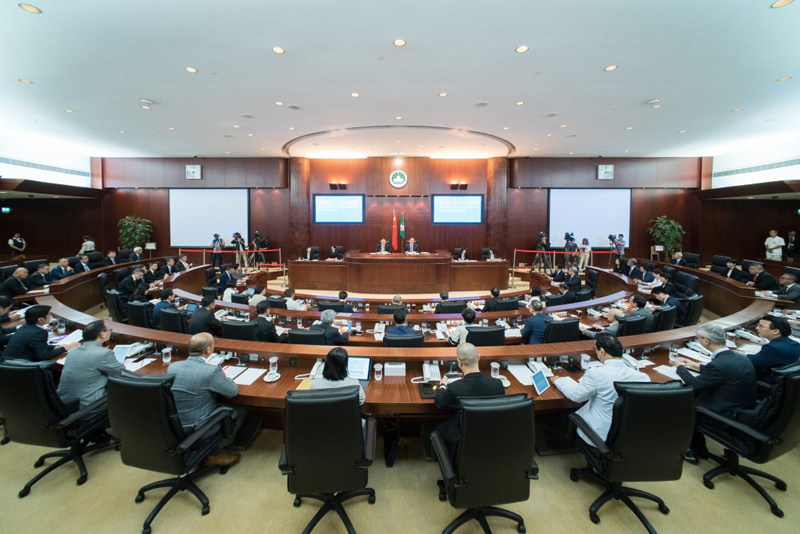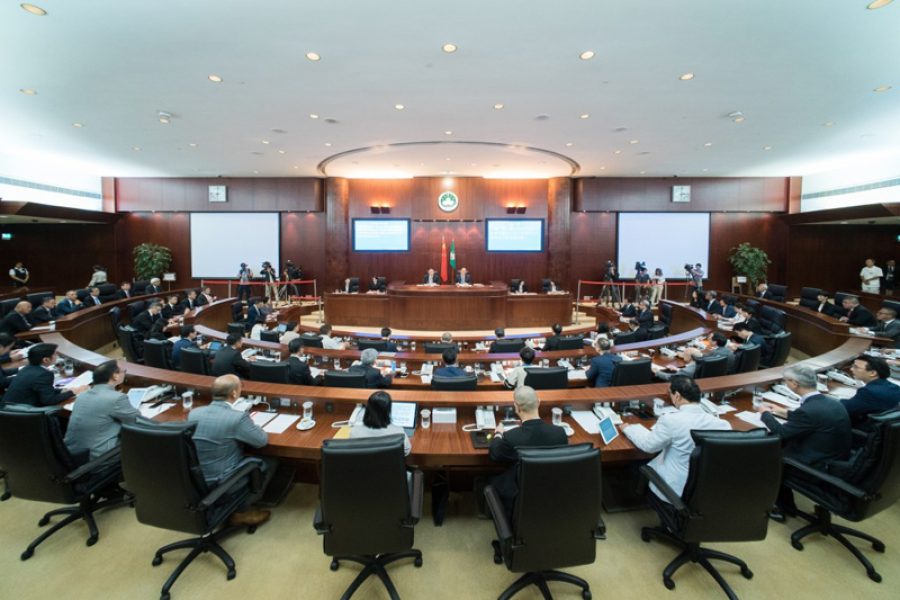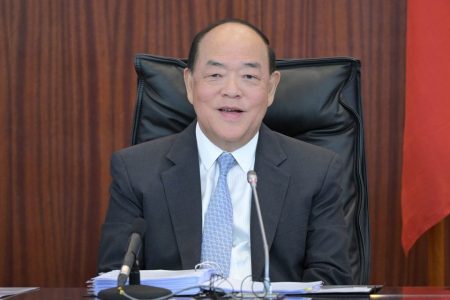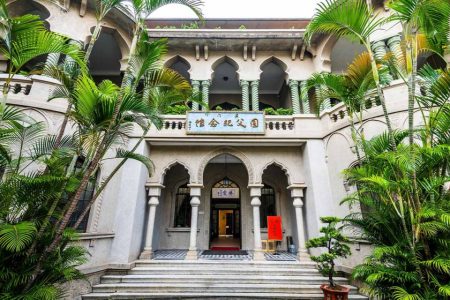Chief Executive Fernando Chui Sai On reaffirmed Thursday that there is no timetable for his government to propose amendments to the Land Law that took effect just several years ago.
Chui’s remarks came three days after Secretary for Administration and Justice Sonia Chan Hoi Fan told reporters that there was no timetable for the government to propose a Land Law amendment bill.
Chui made the remarks when answering non-establishment lawmaker Sulu Sou Ka Hou’s question during a three-hour Q&A session in the legislature’s hemicycle Thursday.
Sou asked Chui whether he will promise to ensure that the city’s land resources will be protected during the remaining period of his term which ends in December next year.
A total of 30 lawmakers asked Chui questions.
The legislature has 33 members. When Sulu Sou asked the chief executive his question, he stood up and spoke – as he normally does when he addresses a plenary session in the hemicycle. Among the 30 lawmakers, he was the only one who stood up when asking his question.
Each lawmaker could ask one question which had been submitted to Chui in advance.
Sou said that Macau continued to be affected by alleged irregularities resulting from the improper management of the city’s land resources and alleged misconduct by officials concerning the granting of land concessions.
Replying to Sou’s question, Chui said that he had always carried out his duties in strict adherence with the law, including the Macau Basic Law and the Land Law, as well as the nation’s Constitution, since he took office in 2009.
Chui said that the government had recently received many opinions concerning possible problems resulting from the implementation of the Land Law.
Chui noted that Sonia Chan has already told civil society that the government is studying the matter.
Chui reiterated that there is currently no timetable for the government to propose a Land Law amendment bill. “This is the government’s current stance concerning the Land Law,” he said.
Sou did not specifically ask Chui whether the government plans to propose amendments to the Land Law. But Chui addressed this when answering Sou’s question.
According to local media reports earlier this month, some local property developers have recently been pressing the government to propose amendments to the Land Law so that provisional land concessions are allowed to be renewed after their expiration – under certain circumstances.
The Land Law, which was passed by the legislature in August 2013, stipulates that provisional land concessions cannot be renewed upon their expiration if their leaseholders fail to finish developing the respective plots of land within a maximum concession period of 25 years. The law came into force March 2014 after lawmakers had passed by government-drafted piece of legislation.
Since the Land Law took effect, some representatives of the local real estate sector and some lawmakers have repeatedly urged the government to amend the Land Law so that expired provisional land concessions could be renewed by the government if their leaseholders are not to blame for their failure to finish developing the respective plots of land within the maximum concession period.
Some developers have said that bureaucratic red tape is sometimes responsible for delaying land development projects beyond the 24-year deadline.
Earlier this month, some local media outlets quoted informed sources as speculating that Chui would announce during yesterday’s Q&A session that the government planned to propose amendments to the Land Law.
During the Q&A session, lawmaker-cum-businessman Zheng Anting asked Chui whether the government would propose amendments to the Land Law as its implementation, Zheng said, had created problems in civil society such as the long-running Pearl Horizon row.
The Pearl Horizon land development concession was cancelled by the government in January 2016 as the Hong Kong developer failed to finish the project within the 25-year maximum period. Pearl Horizon pre-sale buyers protested outside the legislature yesterday, demanding that the government assist them in solving their plight.
Replying to Zheng’s question, Chui said that both the current and previous Land Law stipulates the maximum concession period of 25 years for leaseholders to finish developing the respective plots of land.
Chui also said that “surely the government strictly obeys the Land Law that was passed by the Legislative Assembly (AL).”
Chui said that if leaseholders thought that the government has done something wrong when cancelling a provisional land concession that had previously been granted to them, they could always choose to take legal action against the government.
Lawmaker-cum-building contractor Mak Soi Kun also asked Chui a question about the implementation of the Land Law. Mak referred to two cases in recent years in which the government cancelled two provisional land concessions. He asked whether the two cancellations were due to possible wrongdoings by officials or due to the implementation of the Land Law.
In reply, Chui replied that Mak’s doubts on the court rulings concerning the two land concession cancellation cases should be respected. But Chui urged Mak and others in civil society to respect court rulings as local society respects the rule of law.
Chui said that every dispute should be ultimately solved through judicial means – if parties involved in a dispute cannot reach a settlement.
“While everyone has different views [concerning particular cases], all of them should respect the courts’ rulings,” Chui said.




